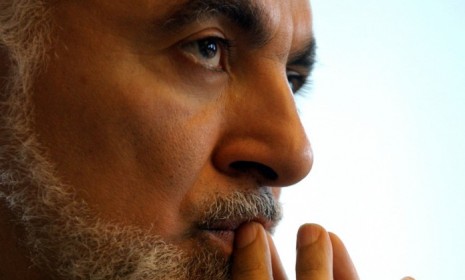Who is Feisal Abdul Rauf — the man behind the 'Ground Zero mosque'?
Moderate Muslim bridge-builder or secret terrorist enabler? Here's a guide to the Iman who instigated plans for the controversial Park51 Islamic center

A free daily email with the biggest news stories of the day – and the best features from TheWeek.com
You are now subscribed
Your newsletter sign-up was successful
Almost as controversial as the proposed Park51 Islamic community center two blocks north of Ground Zero is the man behind the project, Imam Feisal Abdul Rauf. Opponents of the "Ground Zero mosque" are building a case that Rauf is a "cynically brilliant" Islamic extremist in sheep's clothing, while supporters call him and fellow Park51 organizers "the kind of Muslim leaders right-wing commentators fantasize about: modernists and moderates who openly condemn the death cult of al Qaeda and its adherents." Who is the real Rauf? (Listen to some of Imam Rauf's controversial comments)
What's his background?
Born in Kuwait in 1948, Rauf has lived in New York since 1965, and has a physics degree from Columbia. He's been imam of Masjid al-Farah, a Sufi mosque in New York City's TriBeCa neighborhood, since 1983. Rauf has written three books on Islam and how it fits into Western society. He's married to his second wife, Daisy Khan.
The Week
Escape your echo chamber. Get the facts behind the news, plus analysis from multiple perspectives.

Sign up for The Week's Free Newsletters
From our morning news briefing to a weekly Good News Newsletter, get the best of The Week delivered directly to your inbox.
From our morning news briefing to a weekly Good News Newsletter, get the best of The Week delivered directly to your inbox.
Was he raised Sufi?
No. His father, Muhammad Abdul Rauf, was a more conservative Sunni Muslim who, with the support of Egypt, taught and studied at universities and mosques outside the Middle East. The elder Rauf moved his family around to England, Malaysia, and then the U.S. The exposure to different religions and Islamic traditions led Feisal to shift to the more moderate and mystical Sufi Islam.
What was Rauf best known for before the Park51 controversy?
Since the 1990s he has been heavily involved in interfaith dialogue with Christian and Jewish leaders, and has founded two nonprofits focused on building bridges between American Muslims, U.S. society, and the Muslim world: The American Society for Muslim Advancement (1997) and the Cordoba Initiative (2003). After 9/11, Rauf did sensitivity training for the FBI and has gone on four U.S.-sponsored speaking tours to the Mideast since 2007 to discuss how Islam meshes with American religious pluralism.
A free daily email with the biggest news stories of the day – and the best features from TheWeek.com
What's the case for him being a "stealth" extremist?
Critics say his peace-and-brotherhood talk covers up support for Palestinian suicide bombers, Iran's repressive Islamic government, radical Muslim clerics, and the imposition of Sharia law in the West. To support these charges, his detractors cite Rauf's refusal to call Hamas a terrorist group and his equating of certain U.S. actions with Islamic terrorism. The Cordoba Initiative and its Park51 project aren't about dialogue, critics say, but rather about proselytizing and spreading Islam.
Is the case persuasive?
Though a few of Rauf's speeches contain some jarring notes (see quotes below), those who have known him for a long time are surprised by the allegations. "To stereotype him as an extremist is just nuts," says the Very Rev. James P. Morton, longtime dean of the Church of St. John the Divine.
What does the Muslim world think of him?
His views "place him as pro-American within the Muslim world," says Anne Barnard in The New York Times. His outreach to Christians and Jews, liberal views on female equality, criticism of several Muslim countries as less true to core Islamic teachings than the U.S., and stated support for Israel have made him suspect in some Islamic circles.
What are some of his controversial quotes?
"We tend to forget, in the West, that the United States has more Muslim blood on its hands than al Qaida has on its hands of innocent non Muslims." (Speech in Australia, 2005)
"I wouldn't say that the United States deserved what happened [on 9/11], but United States policies were an accessory to the crime that happened... We have been accessory to a lot of innocent lives dying in the world. In fact, in the most direct sense, Osama bin Laden is made in the USA." (CBS 60 Minutes, Sept. 30, 2001)
"The Islamic method of waging war is not to kill innocent civilians. But it was Christians in World War II who bombed civilians in Dresden and Hiroshima, neither of which were military targets." (Quoted in Sydney Morning Herald, 2004)
"The Prophet Muhammad has been known as the first feminist... Gender equality is an intrinsic part of Islamic belief." (Huffington Post, 2009)
Sources: New York Times, National Review, Wikipedia, Media Matters, Investigative Project on Terrorism, New Republic, Discover the Networks, NY Daily News, Time